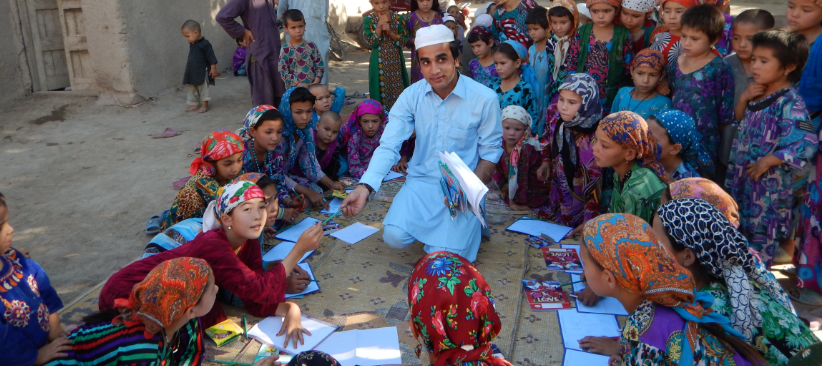As part of its comprehensive child protection programming, PACo is committed to creating safe, inclusive, and supportive environments where children can thrive. We provide community-based early childhood development support through preschool preparation facilities and child-friendly centers at the village level, ensuring that children, particularly those from vulnerable backgrounds, have access to age-appropriate learning, play, and psychosocial support.
These centers are equipped with educational materials, stationery, and recreational tools that promote holistic child development, while also serving as safe spaces for learning, social interaction, and emotional well-being.
To strengthen child protection systems, PACo has established Child Protection Networks (CPNs) at both village and district levels. These networks empower community members to monitor, report, and respond to child protection concerns. We also work to enhance the physical and emotional safety of children by:
- Providing safe play areas in schools,
- Upgrading water, sanitation, and hygiene (WASH) facilities, and
- Building the capacity of teachers on child rights, child psychology, pedagogy, disaster risk reduction, and the identification and prevention of child labor, trafficking, exploitation, and abuse.
Through ongoing awareness-raising campaigns and community engagement, our programs aim to shift harmful social norms and ensure that every child grows up in a nurturing and protective environment.
PACo also actively monitors protection risks and incidents through regular community engagement and field visits. This close presence in the communities allows us to respond effectively and promptly to emerging protection concerns.
Our protection team provides individualized support based on specific protection needs, for example, in the case of gender-based violence (GBV) survivors. Once a protection concern is identified, cases are registered immediately and referred to the appropriate services, such as health care, legal aid, or psychosocial support, in accordance with the nature and urgency of the case.
PACo implements a range of strategic interventions to advance its protection objectives and foster safe, inclusive, and supportive environments for target population. These major interventions include:
Emergency Protection Responses, including rapid assessments during displacement or protection crises, activation of emergency referral pathways, and the distribution of emergency food and non-food items (FI/NFIs) and dignity kits to affected children and families.
Establishment of Child-Enabling Committees in program and project-covered communities, composed of parents, teachers/school management, community elders, and engaged youth, to support child-centered initiatives at the grassroots level.
Creation of Community-Level Child Centers that provide pre-schooling opportunities for both school-age and out-of-school children, especially those deprived of access to formal education.
Provision of Essential Educational and Recreational Support, including regular distribution of educational materials (stationery, textbooks), child center facilitators, recreational tools, refreshments, and adequate WASH facilities to ensure a holistic and child-friendly learning environment.
Formation of District-Level Child Protection Networks involving representatives from local authorities, the district education directorate, community elders, religious leaders, and parents, to coordinate and strengthen protection systems at the district level.
Capacity Building for Child-Enabling Committees and Child Protection Networks through targeted training on child rights, gender-based violence (GBV), risk mapping, safety planning, advocacy, and referral mechanisms.
Training for Teachers and Education Stakeholders on child rights, Protection from Sexual Exploitation and Abuse (PSEA), child psychology, teaching methodologies, disaster preparedness, and first aid to ensure schools are protective, responsive, and resilient.
Awareness and Orientation for Children to enhance their understanding of child rights, protection against abuse, exploitation, trafficking, and encourage their active participation in promoting a safe environment.
Rehabilitation and Upgrading of Educational Facilities, including repairs of school building, boundary wall, installation of WASH infrastructure, solar power system and provision of laboratory equipment, libraries, and computer labs to ensure safe, secure, and quality access to education.
Organizing Awareness Campaigns, Advocacy Activities, and Community Events focused on children’s rights, quality education, prevention of child labor, and anti-trafficking messaging.
Development of Safe Play Areas within educational facilities, equipping child with recreational resources to promote physical, cognitive, and emotional development.
Provision of Psychosocial Support Services to children and adults affected by trauma, violence, or displacement, to promote healing, resilience, and well-being.
Internal Capacity Strengthening on PSEA and Accountability, through regular staff training on Codes of Conduct, and the establishment of a community-based complaints and feedback mechanism, including investigative and disciplinary procedures.
.
